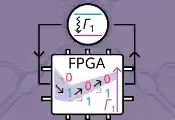Professor Blundell Recognised by IOP
October 14, 2024 -- Professor Stephen Blundell from the Department of Physics at the University of Oxford has been awarded the 2024 Institute of Physics Lawrence Bragg Medal and Prize. The IOP gold medal recognises Professor Blundell’s contributions to physics scholarship and education through the publication of widely-used and influential physics textbooks.
Professor Blundell has written numerous books which have contributed greatly to physics education in the UK and worldwide. Magnetism and Condensed Matter has become one of the most widely used textbooks in magnetism, introducing a generation of PhD students to this field. Concepts in Thermal Physics, written together with Professor Katherine Blundell, is one of the most popular thermodynamics and statistical mechanics textbooks. These two volumes are used throughout the world and have been translated into other languages, including Japanese, Chinese, Arabic, and Greek.
Quantum Field Theory for the Gifted Amateur, written with Tom Lancaster, is particularly popular with graduate students trying to get to grips with this the subtleties of this deep subject, and its success has led to a sequel, General Relativity for the Gifted Amateur (forthcoming). He has also co-edited a textbook Muon Spectroscopy (with Roberto De Renzi, Tom Lancaster, and Francis Pratt) to introduce this experimental technique to the next generation of condensed matter physicists, and his two OUP Very Short Introductions, one on Superconductivity and one on Magnetism, provide popular introductions to those subjects, helping to address the balance of popular physics books which are often biased towards particle physics and astronomy.
Professor Blundell speaks about these subjects in many public lectures and talks, as well as on the radio, and he is an active participant in summer schools around the world to lecture on condensed matter physics to PhD students and postdocs. His books, which are richly illustrated and demonstrate a creative and engaging writing style, resonate with students who find them accessible, entertaining, and motivate them to think and learn.
‘I am thrilled and honoured to be the recipient of this award,’ comments Professor Blundell. ‘It is a particular pleasure to me that it is named after Lawrence Bragg, who combined making leading research contributions with active engagement in physics education, something that I have aspired to do throughout my career. I am particularly grateful to my various co-authors, and to the generations of physics students whose questions have helped to shape the way I think about physics.’




































